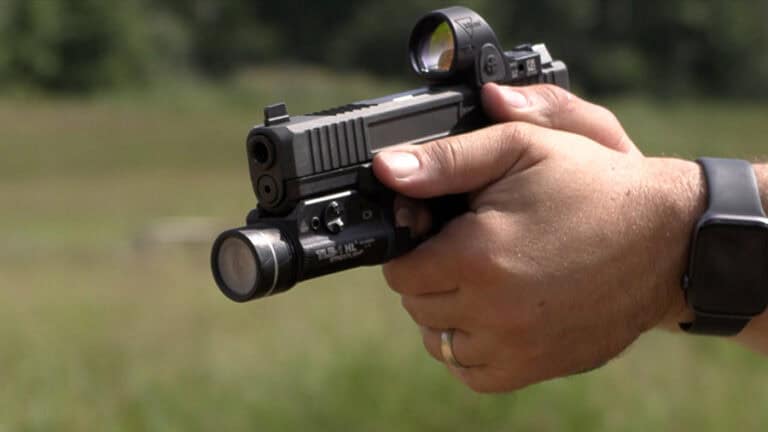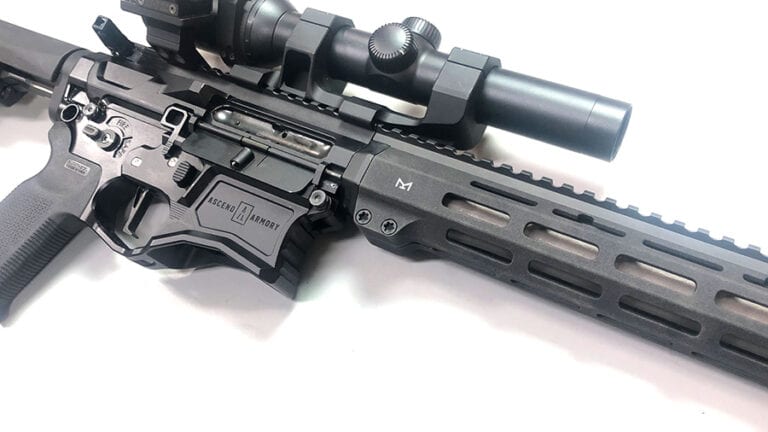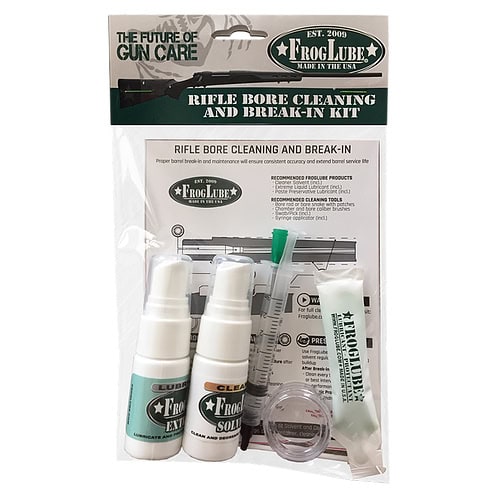SIG Sauer P211 GT4 & GT5—The Sports Cars of SAO Pistols?
In a world where shooters can’t get enough of 2011-style pistols, SIG introduced…
In a world where shooters can’t get enough of 2011-style pistols, SIG introduced…
The Folding Defensive Platform from Zev Technologies—FDP for short—is a new take on…
The GSR-05 Slide Racker is TangoDown’s latest addition to its Vickers Tactical lineup….
All shooting is a balance between speed and precision. By that I mean you can…
The Mod-Navy Qual I’ve been doing this qual (or drill, or whatever the current nom…
• Built for road trips and off-road use• Manual transmission equipped• Wrapped in MultiCam Arctic…
Remembering the Fallen… Validating the Forgotten, Chris Tran Reflects on Police Week in Washington, D.C.
"Even so faith, if it hath not works, is dead, being alone."
This is a bit of a departure for me. I am a full time LEO (law enforcement officer) and that is my primary calling. I refrain from mentioning my department online, or the different hats I wear on the street because in this day and age, what is posted on the Internet by police officers can and will be used against us in the court of public opinion as well as with our respective employers.
I’m not one to typically offer up my personal feelings/opinions on anything political or outside of gear reviews/overviews online for this very reason. That being said, this piece is going to be an exception, as I truly believe it is an important dialogue to be had. Furthermore, I believe this dialogue can be done properly without placing my professional standing or my department’s reputation in a negative light. Sometimes it is helpful to know the man behind the badge, so perhaps you’ll get a little insight into just one simple cop’s mind for a bit.
I attended Police Week 2015 in Washington D.C. two weeks ago. To be clear, I am not a "rah rah" cop who geeks out with Thin Blue Line shirts, tons of morale patches, and law enforcement stickers on the back of my vehicles. Normally I am not one who would be interested in attending Police Week, however this year it was something that I wanted to do for professional and personal reasons.
My agency lost an officer last year, active LEO, but it wasn’t a line of duty death (LODD). There was a small community of officers however, who wanted to commemorate this officer’s life (as well as other officers and military personnel) in a unique ceremony that forced me outside of my comfort zone and made me do a lot of thinking about my law enforcement community.
I love being a cop. I can’t see myself doing anything else at this point, and it was the best career decision I ever made. That being said, it also cost me my marriage, saddled me with seemingly insurmountable divorce debt, child support payments, a bitter ex-wife, and a kiddo who now has to live between two households. The job forever changed me and some of the changes were not for the better. The personal discipline to maintain a healthy life while on duty and off takes a conscious effort and mindfulness; and it’s all too easy to ignore until it’s too late.
What most people, outside of first responders and military personnel don’t understand, is that by choosing to serve, we have placed a burden onto our loved ones and our support networks. We now expect them to accept and support our chosen profession, a profession where us coming home safely has significantly decreased. From the time my little girl was three years old, she was aware that when I dropped her off at school before my shift and kissed her goodbye, that it might be for the last time. She has lived with that reality her entire childhood. By taking that oath to serve my community I have chosen this path for her.
My extended family members deal with the fact that one day they may get a phone call informing them that I am no longer around to go back East to visit them for the holidays. They see and hear all of the anti-government, anti-cop, anti-authority rhetoric that is spewed out there by our ever-burgeoning entitlement society, and call me concerned about my safety. They fear that I may be the next officer to be hacked in the head with a hatchet on a city street, hit with a mason jar of urine and feces at the next Occupy/Socialist/#blacklivesmatter/Anarchist protest, or shot with a sawed-off shotgun while approaching a vehicle on a traffic stop. That stress and reality is cumulative and ongoing, it could last for 20-30 years, or however long our law enforcement career lasts.
No reasoning or stats or rational discussion will quell that fear or ever-constant anxiety. Despite the oft-quoted stats that "Loggers, Garbage Collectors, and Roofers" are more likely to be killed on the job than police officers, out of that list, police officers are the only ones who are actively and feloniously murdered because of the job we do. Hopefully our continued and evolving training and tactics contribute to our lower mortality rate as well, but it’s a rare day where a deep sea fisherman gets murdered simply because he is a deep sea fisherman.
No amount of reasoning will convince a loved one not to worry; they worry because they love us. They can only hope that we will be safe enough and strong enough in our tactics, training, and interpersonal skills so that they will never have to see those worries to become a reality.
I saw a lot of death, stabbings, shootings, and stuff that should remain on the inside of the human body during my first year of patrol. The one that will always stay with me was when my first on-view homicide victim took her last conscious breath while I was trying to keep her from bleeding out. You can never forget the sound of a victim’s agonal breathing. I still dream of her sometimes.
Whether we want to or not, no matter how hard we try to maintain a healthy balance between work and our personal lives, inevitably we still take that crap home to our families. They deal with and experience our stress either vicariously as we vent to them, or actively because they live with us, our demons and our resultant bad habits. We are trained to cope with the traumas; we are taught how to shrug it off, to compartmentalize, to suppress, and to focus on the task at hand. Our families and loved ones aren’t.
When we die or are killed in the line of duty – no expense is spared. Traffic is stopped, escorts are provided and full honors are bestowed. Plaques are dedicated, flags go to half-staff, and we are provided a hero’s funeral with all of the pomp and circumstance that can be provided. The fallen officer’s families are given the usual platitudes: "You will always be a part of our law enforcement family," or "You will never be forgotten," or "Let us know what you need, we’ll always be here for you."
The survivor’s family receives a flag, condolences from elected officials and the deceased’s department heads. The families are also honored and acknowledged for allowing and supporting their loved one’s decision to serve. For in reality, not only did the officer serve and sacrifice, but so did their family. Unfortunately, the families remain to continue sacrificing, as they have an irreparable hole that has been torn into their lives.
I would daresay the sentiment is genuine, and the follow-through is hit or miss depending on the department. Sometimes we organize work crews and tackle odd jobs around the widow/widower’s house, often times meals will be dropped by, and sometimes we’ll attend graduation ceremonies.
So what happens when we die in a non-line of duty death?
Answer: Usually nothing.

Forgive my gallows humor. It’s how many of us deal with things. Like I said before, I’m not a "rah rah" cop, and I’m highly critical of myself and my law enforcement brethren. I’m one of those obnoxious true believers that honestly believe that a life of service CAN make a difference for my fellow man, and that being an officer really is a calling.
My agency lost an officer last year, but it was not a LODD. Not only was it not a LODD, but the officer was married…and gay. Stick with me. In the greater scheme of things, his sexual orientation doesn’t and shouldn’t matter, it certainly didn’t while he was on the streets, and it had no bearing whatsoever on his ability to be an outstanding officer. He died of colon cancer; and when he passed, it was sooner than all of us expected, or had prepared for. Since his death was not a LODD, there were no funeral processions, no arenas filled with officers from around the region, no 21 gun salute, no flag presented to his widow. If he had been in many other states other than this one where gay marriage is recognized, his husband wouldn’t have even been acknowledged as a family member and be allowed to be at his side in the hospital. Put yourself in that situation.
I have another friend that lost her husband last year. He was a 25 year veteran of his department. He earned two Medals of Valor, other departmental commendations and was well respected by many. However he, like all of us, had another face. He had a physical confrontation with his wife in front of their kids and spent Christmas without his family. He was eventually arrested by his own department. This man had a lot of inner demons; a previously failed marriage, immediate family issues, close friends that betrayed or ignored him, medical and financial hardships – and in each category there were multiple disappointments. He had been suicidal and threatened to kill himself with a gun to his chest on several occasions when his wife asked for space. She still cries for him and misses him, because there was still love between them that hadn’t completely vanished. She and their kids were proud of all the good he had done for the community even though the last years of his personal and professional life were poisoned by his poor choices and mental health issues. His support network failed him almost as badly as he failed himself and his family.
I knew a cop once; he and I were not friends but we had spoken briefly in passing. This officer was a pro-active bike officer, like I had been at one point in my career. Bike cops are the department’s hunters – not attached to 911 calls, left to actively and aggressively seek out and capture the criminal element by surprise…at least that’s what they’re supposed to be doing. This cop had a hard-ass reputation; respected and feared by the criminal element, and everyone knew when he was on the block. One day, he slipped up and unbeknownst to all of us, developed a street drug habit. The streets caught up to him, and an internal investigation revealed that he began to shake down local dope dealers for their dope for his own use. Once he was caught and the shame of the truth came out, he drove to a secluded area and killed himself.
I’m not going to tell you how to feel about suicide. I have my own thoughts and beliefs about it, and I’m sometimes conflicted. The METHOD of death, whether it be accident, natural causes, self-inflicted, or whatever, is not the point of the article – maybe something for the future.
Regardless of the instrument of the officer’s passing, there are several constants that remain the same. Pain, Grief, Anger, Denial, Sadness, Shame, Hopelessness, Abandonment, Confusion, Resentment, and Numbness to name just a few. All of these are incurred upon the survivor’s family as with any other passing of a loved one, but for the survivors of lost first responders, it is further compounded by the lack of departmental acknowledgement of the family’s sacrifices.

This is what it’s all about, and something I would urge readers to think about as we exit Memorial Day Weekend and National Police Week 2015.
Like I stated before, our families and loved ones involuntarily live our law enforcement lives. They see what’s behind the badge. They see us when we’re weak, they see us when we’re allowed to be vulnerable, to be human again. They see us when we come home with a haunted look in our eyes…because we discovered a fetus in a garbage can, or worked a prom night wreck, or when a child prostitute we removed from a loading dock is the same age as our child. They see us devastated by our own command staff and politicians that have thrown us under the bus in the name of political correctness, or to make rank or get re-elected, or to reaffirm to their communities that they are taking action when it comes to police accountability.
They see us drink too much. They see us sleep too much. They see us sleep too little. They see us cry. They see us moody, silent, apathetic, sarcastic, angry, violent, calloused, and dismissive. They see us slip into bad habits that could get us in hot water or even arrested if we weren’t careful. They see us distrustful, guarded, and aloof. Their holidays aren’t complete because we’re never around. Their side of the bed is always lonely. Yet they still love us and support us and suffer along with us…and most of the time in silence, because they need to be strong for us; to be our rocks and our foundation when our burdens become too heavy.
Then we leave… either by accident, circumstance, "fate," or by our own hands…and they’re left holding the bag.

I attended a ceremony for the officer that my department lost due to cancer. It was a very unique ceremony, in that it was for law enforcement and military personnel that had passed – but not in the line of duty or killed in action. It was further unique in that it was specifically for LGBTQ officers and military personnel. Not only were the departed’s lives and careers not validated (as they were not LODDs) but the families and partners were often left "out in the cold" often due to the sexual or gender orientation of the fallen. In total, nine fallen were honored. The manners of death were varied: cancer, suicide, train wrecks, car accidents and homicide. The manner of death is not as important as how the officers and military personnel lived.
What was even more striking, was the palpable sense of acknowledgement and validation. I saw families, survivors, spouses, and department members getting the opportunity to see their loved ones commemorated. There was a Color Guard there to perform their ritual ceremony, a Pastor to pray for the fallen and their families, as well as friends and thankful citizens. Representatives from different departments and branches of service presented the survivors with flags and solemn condolences. Granted, it wasn’t a service with full honors, it was that ever important acknowledgement of their lives and their service.
It was in these significant acts that I could feel the weight of the air shift. The hole ripped in the lives of the survivors would never be healed, or filled in, or mended. However, many of the families that were there had lived months if not years waiting for this validation from someone…from anyone. The survivors will never be without the weight of that loss yet most will come to create new memories, to create new smiles, build new relationships and lead fulfilling lives.
All law enforcement families serve and sacrifice by giving their loved ones into service to the community. The husbands, wives, partners, and friends that lose their loved ones in LODDs received departmental acknowledgement and honors, survivor’s benefits, news coverage, and at least temporary validation depending, on the department. For the families that lost their loved ones to causes other than LODDs, well…not so much.
When an officer dies under dubious circumstances that reflect poorly on the department, the officer and the surviving families are often shunned. The officers’ death can get swept under the rug and ignored. It’s as if a career of service to the community never happened and never was.
For officers that pass away due to accidents, or health reasons, some acknowledgements are given at the time. The officers are remembered for their careers, for the good things they did while in service…and then their life of service quickly fades away within the departments and community. It is rare that the families are formally thanked, acknowledged, or validated in any form in a non-line of duty death.
In that moment, I realized that my trip to D.C. was a truly rewarding experience. This self-proclaimed non "rah rah" cop, was saddened yet inspired at witnessing what a little recognition does for the survivor families in their healing process.
Do not forget the fallen. Do not forget their families. There is nothing more you can do for the fallen service member but there is everything that can be done for the loved ones they leave behind.
Hopefully, I’ll be back in D.C. for Police Week 2016. I hope to see you there too.
* The views and opinions expressed on this web site are solely those of the original authors and contributors. These views and opinions do not necessarily represent those of Guns & Tactics Magazine,
the administrative staff, and/or any/all contributors to this site.
Chris Tran is a police officer for a large municipality in the Pacific Northwest. He writes equipment reviews aimed towards the everyday user with a focus on functionality, durability, and cost effectiveness.

In this episode Dave heads to the range to talk about something internet handgun experts often debate about – front slide serrations.

Guns.com Presidents Day sale is happening now. Tons of great deals so don’t miss out on the opportunity to save a bit of money.

This new handguard uses JPs proven barrel nut technology used in their MK III series handguards but adapts it to a slim and rugged rail.
[dcs_img_right framed=”black” w=”145″ h=”162″] http://gunsandtactics.wpengine.com/wp-content/uploads/2012/04/streitgroup.jpg [/dcs_img_right] Streit Group, a global armoured vehicle maker, officially opened its new facility in Ras Al Khaimah, UAE, which with 120,000 square metres…

Burleson, TEXAS, July 19, 2019 – Quick and easy proper break-in and maintenance of the gun’s barrel using FrogLube’s simple guide and product kit.
Wes Doss, of Kyber Interactive Training is a celebrated firearms instructor and law enforcement trainer who has appeared on television shows, has been featured in magazines and is viewed as a recognized authority pertaining to use of force discussions and self defense topics. He is a US Army combat veteran and a retired LEO who has authored two books and was most recently the recipient of the Law Enforcement Defensive Tactics Instructor of the Year award.
© 2026 UN12 Magazine
© 2026 UN12 Magazine
Wait! Don’t forget to